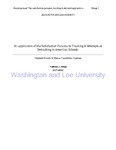An application of the Satisfaction Paradox to Tracking & Attempts at Detracking in American Schools

View/
Author
Ndege, Vanessa J.
Subject
Washington and Lee University, Shepherd Poverty Program
Track system (Education)
Poverty
Discrimination in education
Satisfaction
Education -- Evaluation
Social status
Students -- Attitudes
Self-perception in children
Teacher effectiveness
Metadata
Show full item recordDescription
Capstone; [FULL-TEXT FREELY AVAILABLE ONLINE] Vanessa J. Ndege is a member of the Class of 2012 of Washington and Lee University. Though official policies on tracking in America have been disbanded, underlying cultural and societal barriers unofficially maintain tracking habits. Scholars have credited these barriers as the underlying forces explaining the failure of detracking attempts at getting minority and low SES students to advance out of low and middle tracks into higher educational tracks.
However, I argue that other subtle internal cultural and psychological forces that have not been addressed by detracking efforts are partly attributable to the failure of minority and low SES students to detrack. Proposed here as one of these underlying forces is the satisfaction paradox; a psychological construct that describes a seemingly irrational comfort with one's objectively unsatisfactory state of poverty. I'll attempt to explicate how the cyclical nature of a state of satisfaction in poverty experienced by a child's parents can be replicated and or reinforced within a child who has been low or middle tracked in American schools. [From Introduction] Vanessa Ndege